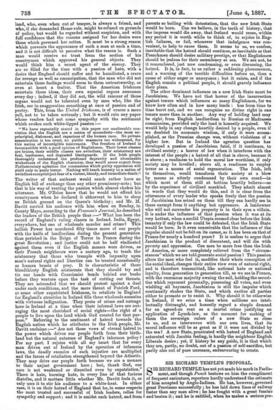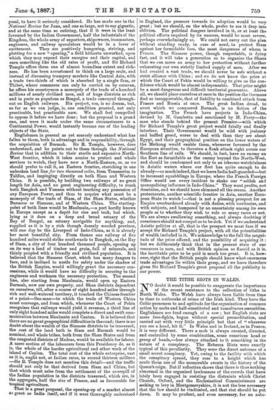SIR RICHARD TEMPLE'S PROPOSAL.
IR RICHARD TEMPLE has not yet made his mark in Parlia- ment, and though Punch bestows on him the compliment of frequent caricature, reporters hardly understand the estimate of him accepted by Anglo-Indians. He has, however, governed great Provinces successfully ; he has laid down lines of railway faster than any man alive ; he has fought with a great famine and beaten it; and he is entitled, when he makes a serious pro-
posal, to have it seriously considered. He has made one in the National Review for June, and one so large, not to say gigantic, and at the same time so enticing, that if it were in the least favoured by the Indian Government, half the industrials of the Kingdom, the whole army of exporters, shipowners, ironmasters, engineers, and railway speculators would be in a fever of excitement. They are positively hungering, striving, and plotting for a new "opening," a field hitherto unworked, upon which they may expend their energies and their capital, and earn something like the old rates of profit, and Sir Richard Temple offers them one of almost boundless extent and rich- ness. He has been accustomed to think on a large scale, and instead of discussing trumpery markets like Central Asia, with a trade two-thirds of which is absorbed by a single firm, or Thibet, where commerce can only be carried on by caravan, he offers his countrymen a monopoly of the trade of a hundred millions of nearly civilised men, and of huge districts as rich and in parts as populous as Bengal, a trade conveyed through- out on English railways. His project, too, is no dream, but, so far as we can judge, is, one condition granted, not only practicable, but practicable now. We shall feel compelled to oppose it before we have done ; but the proposal is a grand one, and were it made under the same circumstances to a Continental Power, would instantly become one of the leading objects of the State,
Englishmen in general as yet scarcely understand what has fallen to them, both in advantage and in responsibility, through the acquisition of Burmah. Sir R. Temple, however, does understand, and he points out to them through the National Review that in addition to their sterile and expensive North- West frontier, which it takes armies to protect and whole services to watch, they have now a North-Eastern, or, as we should prefer to call it, an Eastern frontier, stretching in one unbroken land line for two thousand wiles, from Tenasserim to Talifoo, and impinging directly on both Siam and Western China. It is possible, by building two railways of no great length for Asia, and no great engineering difficulty, to reach both Bangkok and Yunnan without touching any possession of any European Power, and thus to acquire what must be a monopoly of the trade of Siam, of the Shan States, whether Burmese or Siamese, and of 'Western China. The starting- point of both lines would be Maulmain,—a port hardly known in Europe except as a dep8t for rice and teak, but which, lying as it does on a deep and broad estuary of the Bay of Bengal, an estuary navigable for anything, and, supplied as it is by a rich though densely wooded province, will one day be the Liverpool of Indo-China, as it is already her most beautiful city. From thence one railway of five hundred miles would strike southwards to Bangkok, on the Bay of Siam, a city of four hundred thousand people, opening up on its way a land of timber and grain, full of minerals, and thinly peopled with a friendly and civilised population. It is believed that the Siamese Court, which has many dangers to face, and is inclined to nestle for safety under the shadow of the British Empire, would willingly grant the necessary con- cessions, while it would have no difficulty in securing to the engineers and workmen the necessary protection. The second line, also starting from Moulmein, would open up Eastern Burmah, now our own property, and Shan districts dependent on ourselves, till, after a course of eight hundred miles through rich and well-watered territory, it touched the Chinese frontier at a point—Ssu-mao—to which the trade of Western China must converge, and from which, whenever the Court of Pekin recognises that railways would yield it revenue, a third line of only eight hundred miles would complete a direct and swift com- munication between Maulmain and Canton. It is believed that there are no greatgeographical difficulties in the road; there is no doubt about the wealth a the Siamese districts to be traversed, the cost of the land both in Siam and Burmah would be nominal, and whole tribes, both from the Shan States and from the congested districts of Madras, would be available for labour. A mere section of the labourers from this Presidency do, as it is, the whole of the harder agricultural and other work of the island of Ceylon-. The total cost of the whole enterprise, vast as it is, ought not, at Indian rates, to exceed thirteen millions —Sir R. Temple does not mention this detail—and the traffic should not only be that derived from Siam and China, but that which must arise from the settlement of the overspill of the Indian population in the districts traversed, which are, in the aggregate, half the size of France, and as favourable for tropical agriculture.
That is a great proposal, the opening-up of a market almost in England, the pressure towards its adoption would be very great ; but we should, on the whole, prefer to see it drop into oblivion. The political dangers involved in it, or at least the political efforts required by its success, would be most severe, perhaps overwhelmingly so. We could not carry out the plan without standing ready, in case of need, to protect Siam against her formidable foes, the most dangerous of whom is France. The Siamese power, though respectable, is dying fast, and it will take a generation so to organise the Sloane that we can move an army to her protection without further exhausting our own strictly limited supply of men. After we had created a vast trade, we should never be safe without a strict alliance with China ; and we do not know the price at which the Court of Pekin would be willing to give us the con- fidence which would be almost indispensable. That price might be a most dangerous and difficult territorial guarantee. Above all, we should place ourselves at once in the position the Germane find so insupportable, that of liability to combined attack from France and Russia at once. The great Indian dread, to avert which we conquered Burmah, is no fiction of the imagination. The French have projects in Indo-China, devised by M. Gambetta and sanctioned by M. Ferry—the man who stands behind the present Premier—with which Sir Richard Temple's great project would fatally and finally interfere. Their Government would be wild with jealousy and baffled greed, worse to deal with than they are about Egypt, and their geographical position on the lower waters of the Meikong would enable them, whenever favoured by the European situation, to threaten a flank attack right across our Southern line of rails. We should, in fact, have an enemy on the- East as formidable as the enemy beyond the North-West, and should be condemned not only to an irksome watchfulness in Asiatic waters where our fleet has quite enough to do already—so much indeed, that we leave India half-guarded—but to incessant squabblinga in Europe, where the French Foreign Office would use every incident to shake our " selfish and monopolising influence in Indo-China." They want profits, not dominion, and we should have skimmed all the cream. Another protectorate, another scientific frontier in Asia, another Euro- pean State to watch !—that is not a pleasing prospect for an Empire overburdened already with duties, with territories, and with subjects, and hampered by an uncertainty among its own people as to whether they wish to rule so many races or not. We are always swallowing something, and always doubting if conscience should not compel us to be sick. Yet if we understand Asiatic politics at all, that is the prospect we must face if we accept Sir Richard Temple's project, with all the potentialities of wealth included in it. We acknowledge to the full the magni- tude of the prize offered, and the possibility of acquiring it ; but we deliberately think that in the present state of our resources in men, and with British opinion so flaccid as it is, the inevitable price to be paid is much too great. It is, how- ever, right that the British people should know whet enormous trade advantages lie within their grasp, and we have therefore given Sir Richard Temple's great proposal all the publicity in our power.



































 Previous page
Previous page